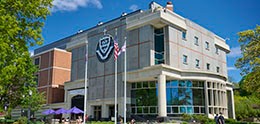West Virginia University
Transform legacy metadata into a dynamic network of knowledge
14 August 2025
West Virginia University Libraries (WVU Libraries) faced a significant challenge: How to ensure the visibility and utility of their legacy metadata while modernizing their discovery systems. Over the last couple of years, WVU Libraries have been piloting a semi-automated process to create Name Authority Cooperative Program (NACO) records for entities affiliated with the state of West Virginia. NACO allows libraries and other institutions to create, edit, and contribute standardized authority records for personal names, corporate bodies, conferences, geographic names, and titles to the LC/NACO Authority File (NAF) — a massive, centralized database of authority records used worldwide. NACO records must be submitted by someone who is trained and certified to do so. WVU Libraries were collaborating with an accredited contributor to achieve this, but when that partnership fell through, it left WVU Libraries with a large amount of NACO records and no way of loading them.
“We had all these NACO records in MARC format and nowhere to put them,” explained Emily Fidelman, Head of Metadata Services at West Virginia University Libraries.
Build a global knowledge graph
The team began by identifying more than 7,000 bibliographic records with West Virginia as a geographic subdivision. They narrowed the dataset to approximately 4,500 distinct personal name entries by excluding thesis authors and focusing on individuals with lasting scholarly significance.
Using tools like MARCEdit and PyMARC, WVU Libraries extracted data from bibliographic records and enriched it with identifiers from VIAF and Wikidata. Student workers and staff manually reviewed sources such as book front matter and genealogy databases to complete biographical details like birth dates and locations. These enriched records were then transformed into Meridian-compatible files, mapping legacy MARC fields to URI-based identifiers.
“Meridian empowered us to advocate more strongly for linked data while ensuring that our curated metadata found a home in a scalable, future-ready system,” Emily noted.
“Meridian empowered us to advocate more strongly for linked data while ensuring that our curated metadata found a home in a scalable, future-ready system.”
Innovate precision, privacy, and ethical metadata
Through the adoption of OCLC Meridian, WVU Libraries are beginning to explore the potential of transforming legacy metadata into a dynamic, connected network of knowledge, using linked data to investigate and validate its impact on discovery services. To quantify the benefits, the team conducted a study comparing MARC-based discovery systems with linked data–powered tools. Using subject fields, titles, and abstracts, they tested the precision and recall of both systems. The results were striking: Linked data consistently returned more precise and relevant results, even for niche topics.
“Being able to quantify how much more precise linked data is—and tie that to our curated metadata—lets us advocate for these systems in a very compelling way,” Emily explained.
Bridge the past and future of discovery
By leveraging WorldCat Entities and OCLC Meridian, WVU Libraries have successfully transformed legacy metadata into a dynamic, connected network of knowledge. By blending meticulous cataloging with cutting-edge linked data tools, they are building a discovery model that is precise, durable, and transparent—a model that serves their community today and prepares them for the challenges of tomorrow.
“Linked data is the future of library workflows. Meridian has positioned WVU Libraries to lead the way in metadata innovation, ensuring that our scholarship remains accessible, discoverable, and impactful for years to come,” Emily concluded.

Introducing OCLC Meridian®
Meridian is a WorldCat Entities™ linked data management tool and suite of APIs that enables the creation and curation of linked data entities and descriptive relationships, forming connections to the existing value in MARC records and other datasets across the global information ecosystem.
Location
- Morgantown, West Virginia, USA
- Encompasses seven different libraries
- Includes collections of more than 1.8 million books, 400,000 ebooks, and 117,000 ejournals
- Is the official library holdings repository for the International Association for Identification
Related stories

Grow your undergraduate programs using collection analysis
Discover how Albertsons Library at Boise State University uses comparative data to make decisions on how to grow their study programs.

Boost visibility of archival and special collections
Learn how University of Scranton improved organization and discoverability by combining digital collections in one place.

